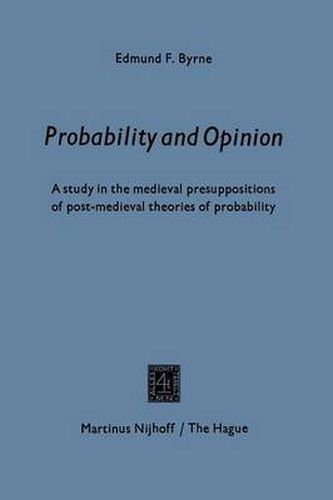Readings Newsletter
Become a Readings Member to make your shopping experience even easier.
Sign in or sign up for free!
You’re not far away from qualifying for FREE standard shipping within Australia
You’ve qualified for FREE standard shipping within Australia
The cart is loading…






This title is printed to order. This book may have been self-published. If so, we cannot guarantee the quality of the content. In the main most books will have gone through the editing process however some may not. We therefore suggest that you be aware of this before ordering this book. If in doubt check either the author or publisher’s details as we are unable to accept any returns unless they are faulty. Please contact us if you have any questions.
Modern physics has accustomed us to consider events which cannot give rise to certainty in our knowledge. A scientific knowledge of such events is nevertheless possible. The method which has enabled us to obtain a stable and exact knowledge about uncertain events consists in a kind of changing of plane and in the replacing of the study of indi vidual phenomena by the study of statistical aggregates to which those phenomena can give rise. A statistical aggregate is not a collection of real phenomena, among which some would happen more often, others more rarely. It is a set of possibilities relative to a certain object or to a certain type of phenomenon. For example, we could consider the differ ent ways in which a die, thrown in given conditions, can fall: they are the possible results of a certain trial, the casting of the die (in the fore seen conditions). The set of those results constitutes effectively a set of possibilities, relative to a phenomenon of a certain type, the fall of the die in specified circumstances. Similarly, it is possible to consider the different velocities which can affect a molecule in a volume of gas; the set of those velocities constitutes effectively a set of possible values which a physical property, namely the velocity of a molecule, can have.
$9.00 standard shipping within Australia
FREE standard shipping within Australia for orders over $100.00
Express & International shipping calculated at checkout
This title is printed to order. This book may have been self-published. If so, we cannot guarantee the quality of the content. In the main most books will have gone through the editing process however some may not. We therefore suggest that you be aware of this before ordering this book. If in doubt check either the author or publisher’s details as we are unable to accept any returns unless they are faulty. Please contact us if you have any questions.
Modern physics has accustomed us to consider events which cannot give rise to certainty in our knowledge. A scientific knowledge of such events is nevertheless possible. The method which has enabled us to obtain a stable and exact knowledge about uncertain events consists in a kind of changing of plane and in the replacing of the study of indi vidual phenomena by the study of statistical aggregates to which those phenomena can give rise. A statistical aggregate is not a collection of real phenomena, among which some would happen more often, others more rarely. It is a set of possibilities relative to a certain object or to a certain type of phenomenon. For example, we could consider the differ ent ways in which a die, thrown in given conditions, can fall: they are the possible results of a certain trial, the casting of the die (in the fore seen conditions). The set of those results constitutes effectively a set of possibilities, relative to a phenomenon of a certain type, the fall of the die in specified circumstances. Similarly, it is possible to consider the different velocities which can affect a molecule in a volume of gas; the set of those velocities constitutes effectively a set of possible values which a physical property, namely the velocity of a molecule, can have.